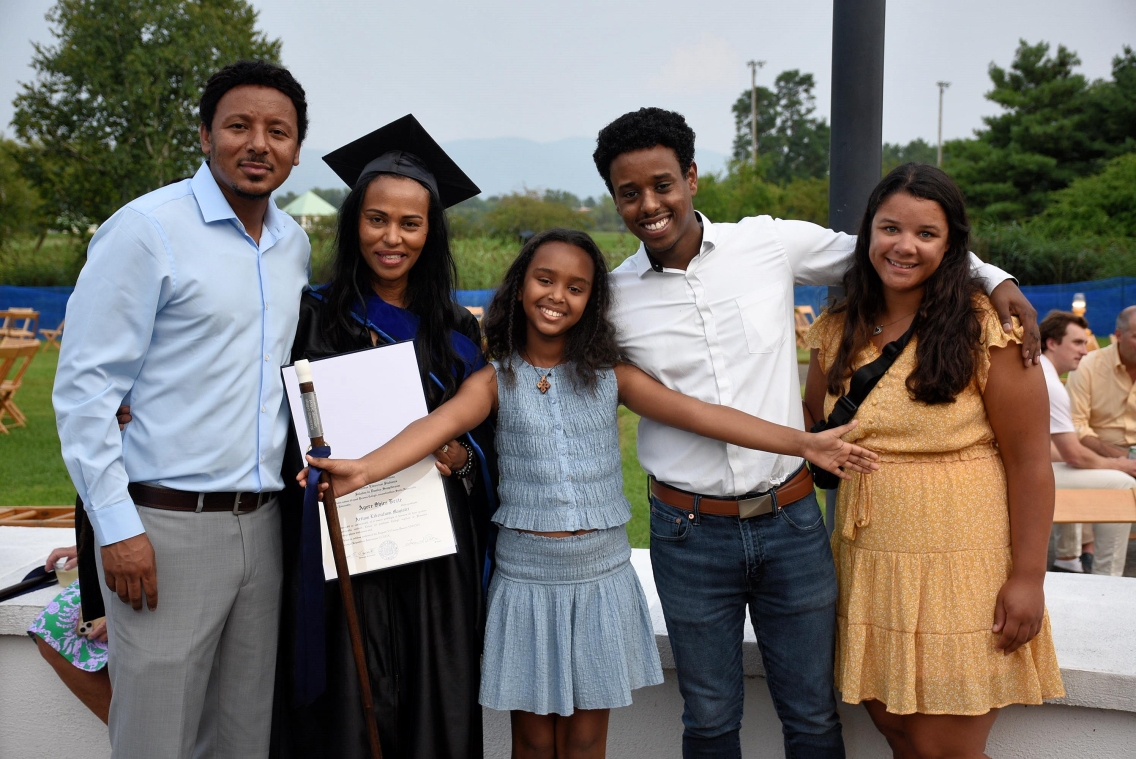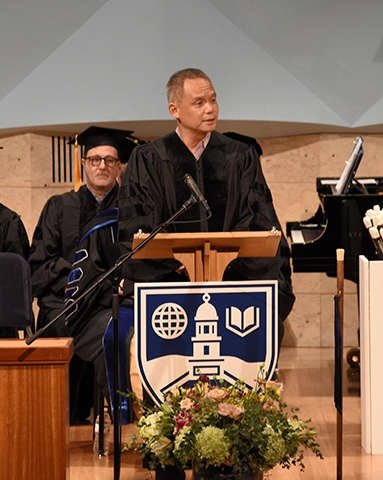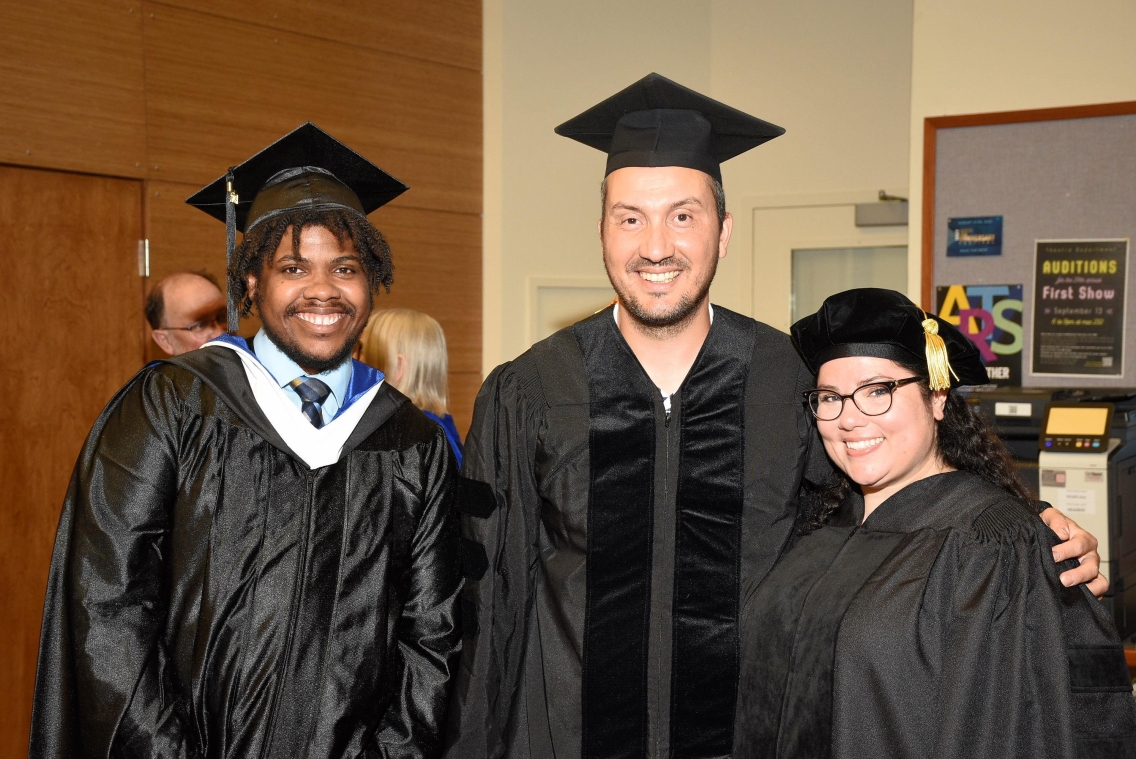Middlebury Language Schools Award 109 Graduate Degrees at 110th Commencement

Throughout his 25-year career as a diplomatic correspondent and bureau chief at The New York Times, Edward Wong witnessed the power of language in over 100 countries. In some cases, it connected entire societies, while in others it was used by those in power to divide and control.
For Wong, language has taken on different meanings over his lifetime, including as a student at the Middlebury Language Schools, where he studied Mandarin Chinese in 2007. He returned for the first time since then on Aug. 16 to share insights with graduates at the Middlebury Language Schools 110th Commencement, held at the Mahaney Arts Center (MAC) Olin C. Robison Concert Hall on the Middlebury College campus.
“I’m thankful for my career as a writer and the opportunities it has given me to engage with the world whether in Iraq or China, or yes, here in the hills of Middlebury,” said Wong, who also attended the Bread Loaf Writers’ Conference in 1994.

Along the way, Wong said he’s learned three lessons: “language is love, language is power, and language is legacy. Those lessons are interconnected. You already know all of this in your heads and hearts. I just want to say, please remember it throughout your lives. You’ll teach these lessons to your students, you’ll write about them, and your wisdom and knowledge will take root in future generations.”
The Language Schools awarded 102 Master of Arts degrees and seven Doctor of Modern Languages degrees at the ceremony. Since the establishment of the German School in 1915, more than 50,000 students have attended one of the schools that includes 13 immersion programs, and more than 12,000 have received advanced degrees, now offered in 10 languages.
Mark Orten, dean of spiritual and religious life and chaplain of the College, and Jesse Bruchac, director of the School of Abenaki, opened the ceremony with a land acknowledgment and invocation honoring the lives and sacrifices made by the Abenaki people.
Middlebury President Laurie L. Patton congratulated graduates for “succeeding in what may have seemed to be a far off goal when you began this journey,” attributing their success in large part to the Middlebury Language Pledge® taken by all students as a commitment to communicating only in their language of study during their time on campus.
“At the beginning of the many summers in which you worked to earn your degree you were told ‘may the pledge be with you,’” said Patton, explaining that the well-known Star Wars phrase was actually taken from early Indian Sanskrit texts. “For early Indian thinkers, the idea of the force was not waving a lightsaber, but a simple idea that the power of the word held up the world. And the power of the well-spoken word guaranteed human flourishing and prosperity. And 3,000 years later through the power of your well-spoken word, you are contributing to human flourishing and prosperity.”

Markus Clark ’24, who graduated from the Italian School, sang a moving version of “Sento Nel Core” by Italian Baroque composer Alexandro Scarletti. He recently completed the accelerated master’s program, spending a year in Florence where he finished his degree.
“The Language Schools at Middlebury offer the opportunity to actually love the language and the culture, not just learn it, by immersing yourself in a way that traditional programs can’t,” said Clark, who lives and teaches English in Italy and plans to return to the Italian School next summer as a bilingual assistant.
Timothy W. Page, acting dean of the Language Schools, thanked Patton, who will be leaving the College in January to serve as president of the American Academy of Arts & Sciences, for her support of the Language Schools.
“You leave behind a rich programmatic legacy, which includes the School of Abekani and the Conflict Transformation initiative,” said Page. “But equally important, you leave a vision for Middlebury. You have encouraged those of us involved in languages to view these times of declining enrollment in world languages as an opportunity – a time for Middlebury to grow and help when others are not able to meet the nation’s needs.This ambition will live on.”
Wong, a correspondent in Iraq and bureau chief in Beijing, won the Livingston Award for international reporting and was a Pulitzer Prize finalist for team coverage of the Iraq War. He has been a Nieman Fellow at Harvard University and a visiting professor at Princeton University and U.C. Berkeley. He completed fellowships at the Wilson Center and the Belfer Center at Harvard Kennedy School. He speaks widely on global issues having appeared on CBS, MSNBC, PBS, NPR, and the BBC.
Wong emphasized the importance of language to his family by sharing excerpts from his new book, “At the Edge of Empire: A Family’s Reckoning with China (Viking Press, 2024),” a memoir that includes anecdotes from his reporting on modern China and Chinese diaspora.
“You’ll spend years and decades enriching the lives of others,” said Wong, who received an honorary doctorate during the ceremony. “So for the sake of our world, our very fragile world, I wish you the best of luck. In Mandarin we say ‘yi lu ping an’ – may your journey be safe.”
Commencement was broadcast live for graduates and their families to watch from across the world. The English Language School is the newest Language School, located at the Middlebury Institute of International Studies at Monterey. The Master of Arts in Teaching (MAT) with Licensure launches in the Summer of 2025 and offers a secondary (7–12) teaching license in modern languages valid for teaching in U.S. public school systems.

